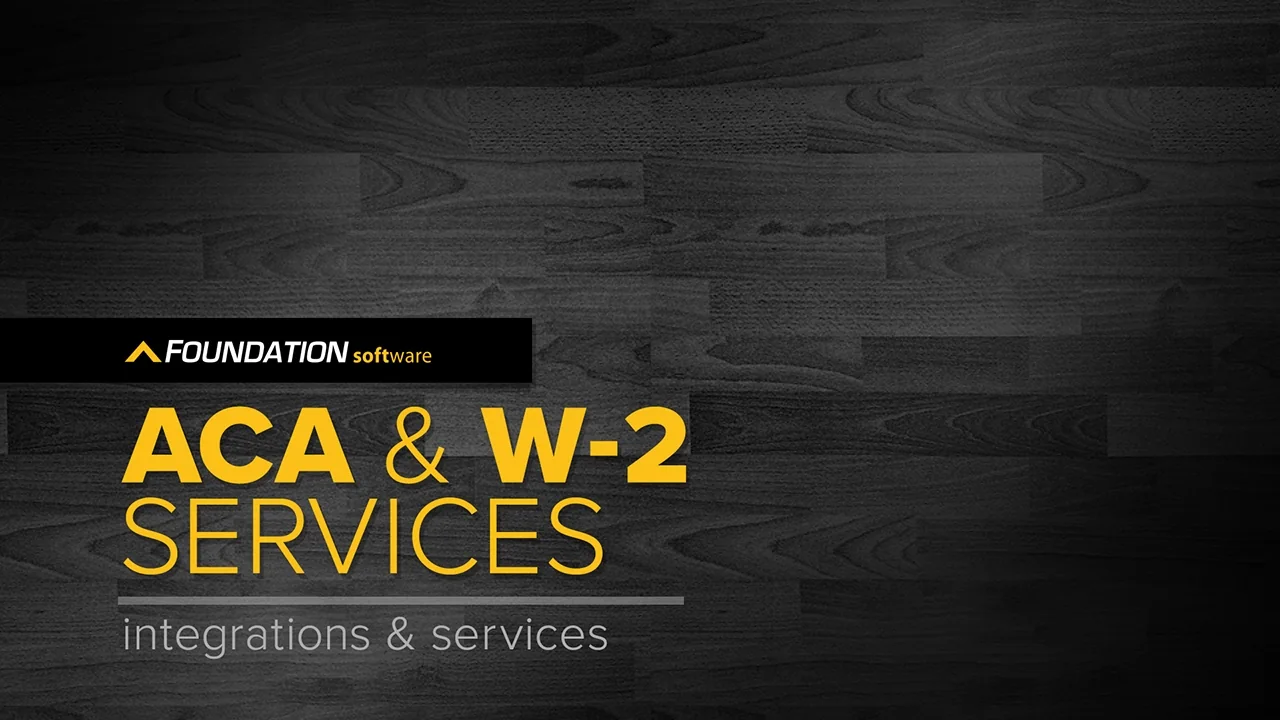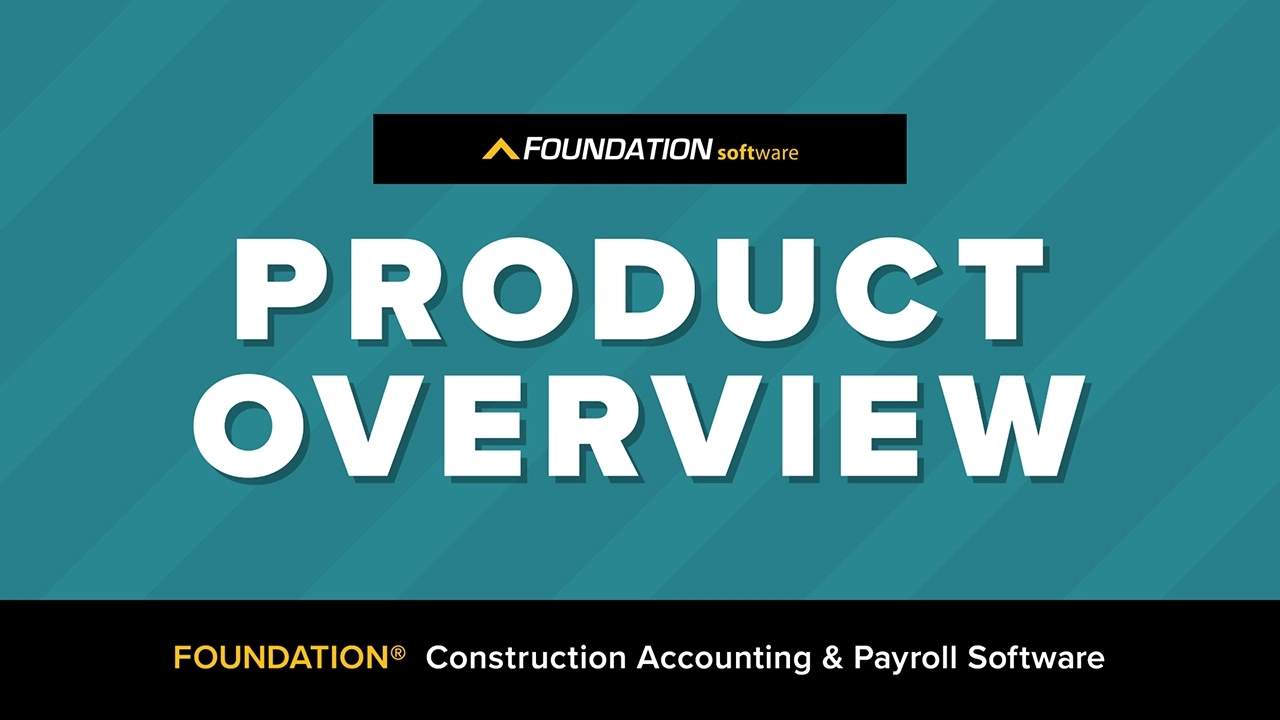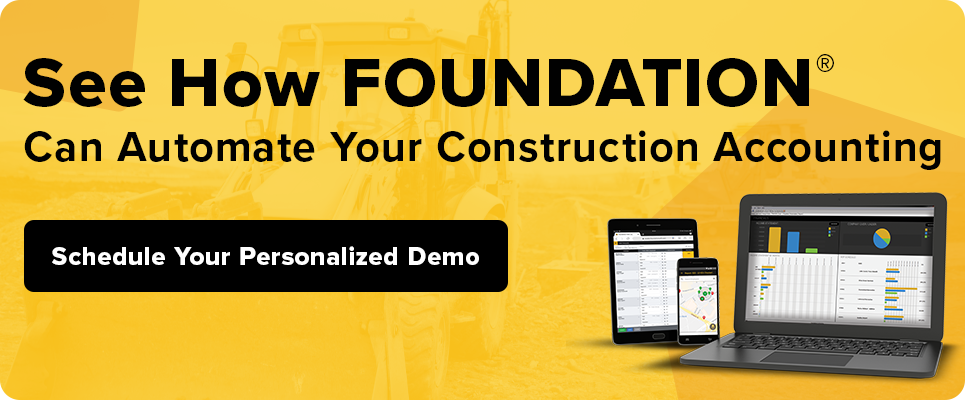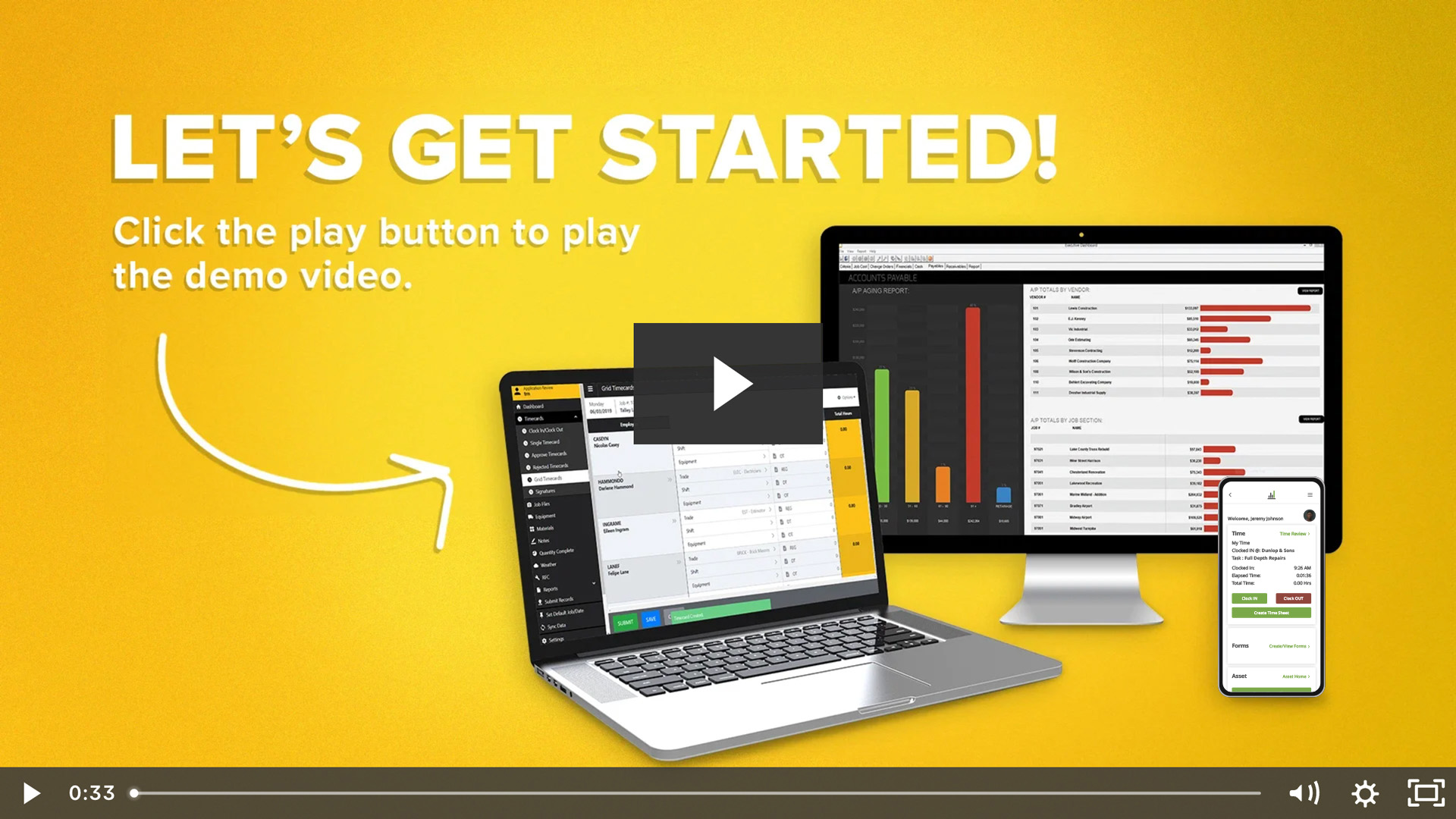
Construction accounting software has revolutionized how contractors handle their money, turning mountains of paperwork into streamlined digital workflows that integrate job costing, progress billing, and cash flow management into unified construction financial systems
Let’s face it – keeping track of cash flow in construction isn’t like running a retail store or restaurant. You’re juggling multiple projects, each with their own timelines, payment schedules and unexpected costs. One delayed payment or miscalculated expense can throw your whole operation off balance.
Gone are the days of stuffing receipts in a shoebox or trying to reconcile accounts using basic spreadsheets. Modern solutions like FOUNDATION® put powerful financial tools at your fingertips, helping you stay on top of every dollar flowing in and out of your business.
Whether you’re a small contractor or running a large construction firm, having the right systems in place can mean the difference between thriving and just barely surviving.
Key Takeaways
- Construction cash flow is complex because projects have irregular income and high upfront costs.
- Cash flow problems often come from poor job costing, slow billing and not tracking the right financial metrics.
- Good construction software must include job costing, progress billing and mobile access for field teams.
- Progress billing software helps you get paid faster by tracking completed work and managing change orders.
- FOUNDATION® helps contractors track budgets, labor, equipment and materials across all projects for better cash control.
Understanding Construction Cash Flow Basics
Managing money in construction requires a unique approach compared to other industries.
Construction cash flow management involves tracking multiple projects, each with its own timeline and payment schedule.
Modern construction accounting software transformed how contractors handle these complex financial workflows. It makes it easier to stay on top of expenses and revenue across various job sites.
Why Construction Cash Flow is Different
A retail store might see daily sales and predictable inventory turnover.
Construction projects operate on completely different timelines with irregular payment schedules, substantial material investments, and ongoing labor obligations that general accounting software cannot effectively manage.
What makes construction unique includes:
- Project-based revenue streams mean irregular income patterns, with large payments tied to milestone completions
- Material purchases require substantial upfront costs
- Labor expenses continue whether progress payments arrive on time or not
- Equipment costs need consideration even during project downtime
- Retention holds can tie up significant portions of earned income
Each project represents a significant financial commitment. Contractors need to plan expenses long before any payment arrives.
Common Cash Flow Pitfalls in Construction Projects
Even experienced contractors can fall into financial traps that damage their bottom line. Understanding common pitfalls helps construction professionals spot potential problems before they become critical.
- Construction cost management becomes more straightforward when contractors know what to watch for and have the right tools to monitor their finances.
- Poor job costing leads to underbidding projects. Inadequate tracking of labor hours, material waste and equipment time can erode profit margins quickly.
- Delayed billing or poorly structured payment schedules create cash shortages. The lack of cash ripples through the entire operation, causing major problems and headaches.
Without proper construction billing software, keeping track of these various elements becomes nearly impossible.
Key Financial Metrics Every Contractor Should Track
Success in construction depends on monitoring the right numbers. Financial performance indicators provide early warning signs of potential problems and highlight areas for improvement.
Construction professionals need to track several critical metrics to maintain healthy cash flow. Essential metrics for contractors to monitor include:
- Working capital ratio – Shows ability to cover short-term obligations
- Accounts receivable aging – Tracks outstanding payments and collection efficiency
- Job cost variance – Compares estimated versus actual costs
- Gross profit margin – Measures project profitability
- Equipment utilization rate – Ensures efficient use of costly assets
Using dedicated project accounting software makes tracking these metrics much simpler than traditional methods. Real-time data access helps contractors make informed decisions about resource allocation, billing schedules and project timelines.
With proper monitoring of these key indicators, construction businesses can maintain healthy cash flow and sustainable growth.
Setting Up Your Digital Financial Framework
The transition from paper-based systems to digital tools is a critical turning point for construction businesses.
A robust digital financial infrastructure powered by construction accounting software creates the foundation for better financial control and growth.
Modern construction companies need systems that can handle the complexity of project-based accounting.
Choosing the Right Construction Accounting Software

Selecting appropriate financial management tools represents one of the most important decisions a construction company can make.
There are many key considerations for contractors to consider when evaluating software options. Some include:
- Industry-specific functionalities including job costing, progress billing, invoicing and reporting
- Scalability to accommodate business growth and multiple projects
- Mobile accessibility for field teams and remote work
- Security features to protect sensitive financial data
- User-friendly interface that construction professionals can navigate easily
- Seamless integrations with project management software, estimating tools and equipment tracking systems
- API capabilities for connecting with specialized construction industry applications
- Accessible, in-house support team
General accounting software might work for basic bookkeeping. But construction projects demand specialized features that standard solutions can’t provide.
Essential Features for Cash Management
Construction-specific accounting platforms are designed to address the unique challenges of the industry.
Quality software integrates critical cash management features that help contractors maintain healthy financial operations.
Robust construction accounting platforms include:
- Advanced job costing capabilities to track project profitability in real-time
- Sophisticated tools for accounts payable management
- Streamlined billing processes
- Comprehensive financial reporting
These systems’ ability to handle complex payroll requirements, including certified payroll and union regulations, makes them valuable for construction companies.
They are especially useful for contractors working on government contracts or prevailing wage projects.
Job Costing and Cash Flow
At the core of construction cash flow management lies effective job costing software that tracks labor costs, material expenses, and equipment allocation across multiple construction projects.Job costing is the process of tracking all expenses and revenue associated with specific projects.
Construction-specific accounting software enables precise job costing that directly impacts cash flow by:
- Identifying profitable vs. cash-draining projects in real-time
- Tracking labor, material, equipment and subcontractor costs against budgets
- Providing early warning signals when costs threaten to exceed estimates
- Enabling more accurate bids based on historical performance
- Streamlining payment applications by documenting completed work accurately
By implementing robust job costing through specialized software, contractors can anticipate cash needs. They can also identify profitability issues before they become cash flow crises and maintain the steady revenue stream necessary for operational stability.
Optimizing Accounts Receivable
The lifeblood of any construction business flows through its accounts receivable (A/R) process. Without proper management of incoming payments, even the most successful projects can lead to cash flow challenges.
Delivering quality work is essential. Getting paid for that work is equally important. It requires a skilled approach to maintain healthy cash reserves.
Modern construction accounting software transforms the complex task of tracking and collecting payments. It turns the process into a streamlined operation that directly improves cash flow.
Proper A/R management through digital tools provides contractors with real-time visibility into their financial position. It also helps predict future cash availability, ensuring resources are always available for critical operations.
Creating Progress Billing
Progress billing represents a critical component of construction finance. It directly affects cash inflow. It requires careful attention to detail and precise timing to ensure consistent cash availability.
Construction billing software enables contractors to create professional, accurate billing documents that align perfectly with contract terms and completed work.
The right construction billing software accelerates payment cycles through automated invoice generation, milestone completion tracking, and integrated change order processing to improve overall cash position.
The software tracks percentage of completion. It automatically calculates appropriate billing amounts and generates polished documents.
In turn, this inspires confidence in clients and reduces payment delays that can strain cash reserves.
Essential elements of effective progress billing that impact cash flow include:
- Work completion tied to schedule milestones for predictable cash inflows
- Percentage-based calculations matched to contract terms for accurate billing
- Supporting documentation including photos and daily reports to prevent payment disputes
- Change orders integrated into regular billing cycles to capture all revenue
- Payment schedule tracking against project timelines to forecast cash availability
Construction professionals who master progress billing through their accounting software often receive payments faster and encounter fewer disputes about billed amounts.
Investing in the right tools can directly improve their cash flow position.
Tracking Change Orders
Change orders can significantly impact project cash flow in one of two ways:
- Positively by bringing in additional revenue
- Negatively through scope creep without compensation
An integrated change order management system provides a structured approach to documenting, pricing and billing for additional work. This ensures these modifications translate into timely cash inflows rather than delayed disputes.
The software maintains a clear audit trail of all changes. This helps contractors avoid payment delays and ensure proper compensation for extra work performed. In turn, the software protects cash flow.
Critical aspects of change order tracking that affect cash flow include:
- Cost impact analysis on project budgets and cash requirements
- Schedule adjustment tracking to anticipate payment timing changes
- Approval workflow management to eliminate payment delays
- Integration with original contract values for accurate billing
- Automatic billing updates for approved changes to accelerate cash collection
Proper change order management through dedicated software helps contractors maintain better control over project scope. It ensures all additional work translates into appropriate compensation that supports cash flow.
Collections Best Practices
Even the best-run projects can face payment challenges that threaten cash flow stability. Strong collection practices are essential for maintaining operational liquidity.
Accounts receivable management tools help contractors proactively address aging receivables before they create cash flow crises.
The software provides automated reminders, tracks communication history and helps identify patterns that might indicate potential collection problems.
Modern collection tools help construction professionals balance professional relationships with timely payment requirements. It generates standardized collection letters, tracks response rates and provides aging reports that help prioritize collection efforts based on cash flow impact.
This systematic approach to collections helps contractors maintain steady cash flow while preserving important client relationships for future work opportunities.
Integration with electronic payment systems further streamlines the collection process, making it easier for clients to pay and accelerating cash inflow.
Construction companies can offer various payment options through their accounting software, including traditional checks and electronic transfers. This reduces payment friction and improves cash position.
Managing Project-Based Finances
Project-based financial management is the basis of successful construction operations. It directly impacts cash flow sustainability.
Unlike traditional businesses with steady revenue streams, construction companies must carefully orchestrate multiple project budgets. Each project has its own timeline and cash requirements.
Construction-specific software transforms this complex juggling act into a manageable process that supports healthy cash flow.
Budget Setup and Tracking

Creating and maintaining accurate project budgets requires a deep understanding of both construction costs and cash timing.
Modern construction budgeting tools enable contractors to build detailed budgets that account for every aspect of a project and their associated cash requirements.
The software helps break down complex projects into manageable cost codes. This allows for precise tracking of expenses against estimates and early identification of issues that might strain cash reserves.
Essential components of construction budgeting that impact cash flow include:
- Direct cost allocation for materials, labor and equipment with payment timing
- Overhead distribution across multiple projects to ensure adequate cash coverage
- Contingency planning for unexpected expenses that could drain reserves
- Profit margin calculations based on project complexity and cash requirements
- Cash flow forecasting throughout the project lifecycle
These digital tools transform traditional budgeting methods. They provide real-time updates and automated alerts when costs approach or exceed budgeted amounts.
Software solutions help construction professionals take corrective action before small variances become major cash flow issues.
Labor Cost Management
Labor represents one of the largest and most immediate cash outlays in construction projects. Payroll requirements cannot be delayed regardless of client payment status.
Labor tracking systems help contractors monitor workforce costs with unprecedented precision. It allows for better cash flow planning.
The software tracks regular hours, overtime, benefits and burden rates. In turn, this helps companies anticipate and prepare for these significant cash requirements.
Modern labor management systems help construction companies optimize their workforce allocation across multiple projects, providing clear visibility into labor costs and productivity rates that impact cash outflows.
These tools help contractors make informed decisions about staffing levels and resource distribution to maintain healthy cash positions.
Equipment Cost Allocation
Proper equipment cost tracking directly affects cash flow through large initial investments, ongoing maintenance expenses and operating costs.
Equipment management helps contractors track both owned and rented equipment costs. This includes depreciation, maintenance, fuel and operator expenses.
The software can automatically allocate these costs to appropriate projects based on usage time and type of work performed. This creates more accurate cash requirement forecasts.
Critical elements of equipment tracking that impact cash flow include:
- Usage rates across projects for equitable cost distribution
- Maintenance scheduling and cost tracking for cash planning
- Fuel consumption monitoring for operational expense forecasting
- Depreciation calculations for owned equipment to inform replacement timing
- Rental cost comparisons for decision-making that optimize cash utilization
This systematic approach to equipment cost management helps construction professionals make better cash-conscious decisions across their project portfolio.
Material Cost Tracking
Accurate material cost tracking stands as a crucial element in construction project success and cash flow management. Materials often represent significant upfront expenses before client payments begin.
Material management systems provide contractors with the tools to monitor material costs from purchase order through final installation. The software:
- Tracks material deliveries
- Compares actual costs against estimates
- Helps identify potential savings opportunities that can improve cash position
The system maintains detailed records of material costs by cost code, allowing construction professionals to analyze pricing trends. It also helps identify opportunities for bulk purchasing or alternative materials that might reduce cash requirements.
Integration with inventory management features helps contractors optimize material ordering and storage. It helps reduce waste and improve cash flow through better timing of purchases relative to payment schedules.
Taking Control of Construction Cash Flows With FOUNDATION
Managing cash flow in construction demands a strategic approach that combines careful planning, detailed tracking and proactive financial management.
From the basics of construction accounting to advanced forecasting models, contractors need integrated systems that can handle the unique complexities of project-based finances.
Success depends on maintaining tight control over accounts payable and accounts receivable. Contractors need to simultaneously manage labor, equipment and material costs across multiple projects.
By implementing FOUNDATION construction accounting software, contractors can streamline their entire financial operation. This includes everything from initial budgeting to final payment collection.
Whether managing a single large project or coordinating multiple job sites, construction professionals can use FOUNDATION to maintain strong financial control and drive profitability through better cash management.
Get a demo today!
Share Article
Keep on current news in the construction industry. Subscribe to free eNews!
Our Top 3 YouTube Videos
Learn about our software more in depth with product overviews, demos, and much more!

Our ACA reporting & e-filing services include official 1094-C and 1095-C IRS reporting, optional e-filing (no applying for a TCC code required), mailing to your employees and experienced support to help you.

There are plenty of reasons to make FOUNDATION your choice for job cost accounting and construction management software — just ask our clients!

From job cost accounting software, to construction-specific payroll. Get an overview on your next all-in-one back-office solution.





